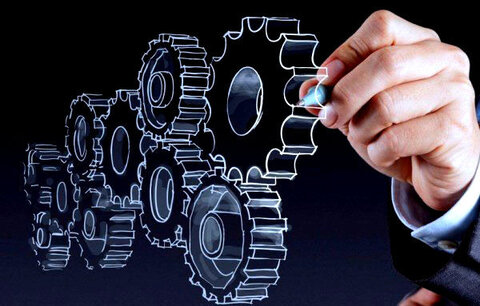Iran (IMNA) - Currently, some 5,000 knowledge-based companies are active in the country, manufacturing diverse products to meet the needs of the domestic market while saving large amounts of foreign currency.
Although sanctions have put pressure on the country, it has provided a unique opportunity for business development and the activity of knowledge-based companies in the country.
The fields of aircraft maintenance, steel, pharmaceuticals, and medical equipment, oil and gas are among the sectors that researchers in technology companies have engaged in, leading to import reduction.
In recent years, the vice presidency for science and technology has been supporting knowledge-based companies active in the production of sanctioned items, Ismail Ghaderifar, head of the center for strategic technologies development of the vice presidency of science and technology, said.
“Although we are facing the toughest and most severe sanctions in the field of the aviation industry, the country's air fleet is working well in the field of repair and overhaul of aircraft engines by knowledge-based companies,” he stated.
Even these researchers are taking a big step to build turbine systems and air engines, which will be achieved in the next 4-5 years, he added.
Graphite electrodes save $60-100m
Ghaderifar went on to note that another area of great importance is the steel industry, where two knowledge-based companies entered and produced the “graphite electrodes” that are a basic need of steel companies.
Regarding the foreign exchange savings that the production of these graphite electrodes has brought, he noted that it is estimated at about $60-100 million.
No need to import anti-corona items
Ghaderifar added that under sanctions in the most difficult conditions, Iran combatted the pandemic and knowledge-based companies could make the country independent. Moreover, they managed to produce pharmaceutical items required by the country's health system.
“Also, the production of medical equipment such as ventilators is one of the honors of knowledge-based companies, which is a vital and important item for ICU patients, which have even reached the export stage,” he said.
Electrospinning is another product made by knowledge-based companies, which can apply a nano-layer on the fibers. Europe which was the only producer of the product refused to transfer the production line to Iran due to sanctions, and the price of each production line was one million euros, he highlighted.
Sourena Sattari, the vice president for science and technology, told the Tehran Times that some of the knowledge-based companies reached a production capacity of more than 200-300 thousand diagnostic kits per day, which surpassed the country’s need for diagnostic kits, and there is a great export potential.
Pointing out that multiplying the production of COVID-19 equipment led to significant measures that led to foreign currency saving for the country, he said “it also helped us cope with problems and not to run out of equipment because no matter how much money we gave, no country had the equipment to sell.”
Production of cancer medicine
“Doxorubicin, Sina Doxosome in Iran, is a drug based on indigenized knowledge that was previously monopolized by the United States, Canada, and India.
It is a chemotherapy medication used to treat cancer. This includes breast cancer, bladder cancer, Kaposi's sarcoma, lymphoma, and acute lymphocytic leukemia. It is often used together with other chemotherapy agents.
The knowledge-based company that produced this drug has succeeded in selling it to the countries of the region over the past two years,” Ghaderifar stated.
Technology in water and wastewater industry
These firms also produced items related to the water and wastewater treatment industry, some of which are used in the field of heavy metal removal, nitrification, wastewater turbidity removal, desalination, industrial wastewater treatment, that cut the country’s need for import, Ghaderifar explained.
“These products have been successfully implemented to reduce the amount of arsenic hazardous metal in drinking water of Ardebil, Kerman, West Azarbaijan, East Azarbaijan, and Kordestan provinces and in desalination of seawater in 15 provinces.
Also, in another project, Tehran Water and Wastewater Company succeeded in reducing water nitrate by 15 times using his product,” he also said.
Helping car industry nullify sanctions
One sector in which the part played by these companies is under the spotlight is the auto industry.
Knowledge-based companies’ role in indigenizing the manufacturing of auto parts is one of the major plans that the Industry Ministry is following up in the current condition.
In February, Industry, Mining and Trade Minister Reza Rahmani announced that indigenizing the manufacturing of auto parts, which used to be imported previously, has so far saved over $2 billion for the country while
creating jobs for 40,000 people, something achieved through befitting from the capabilities of the knowledge-based companies.
The new cars unveiled in February were 90 percent domestically made and just a few of their parts are imported, which is planned to be indigenized as well in the coming years.
Exports to reach $1b within few months
Sattari said that U.S. sanctions caused exports of knowledge-based companies to decline three years ago, however, it has returned to growth and is projected to reach the pre-sanctions level of more than $1 billion by the end of the current [Iranian calendar] year (March 20, 2021).
Fortunately, last year, companies achieved a record sale of 1.2 quadrillion rials (nearly $28.5 billion at the official rate of 42,000 rials), which is expected to increase by 40 percent this year.
To date, 42 knowledge-based companies with a total value of 2.8 quadrillion rials (nearly $66.6 billion) have been listed on the stock exchange and they will soon turn into the biggest businesses in the county, Sattari said.
Tehrantimes


Your Comment